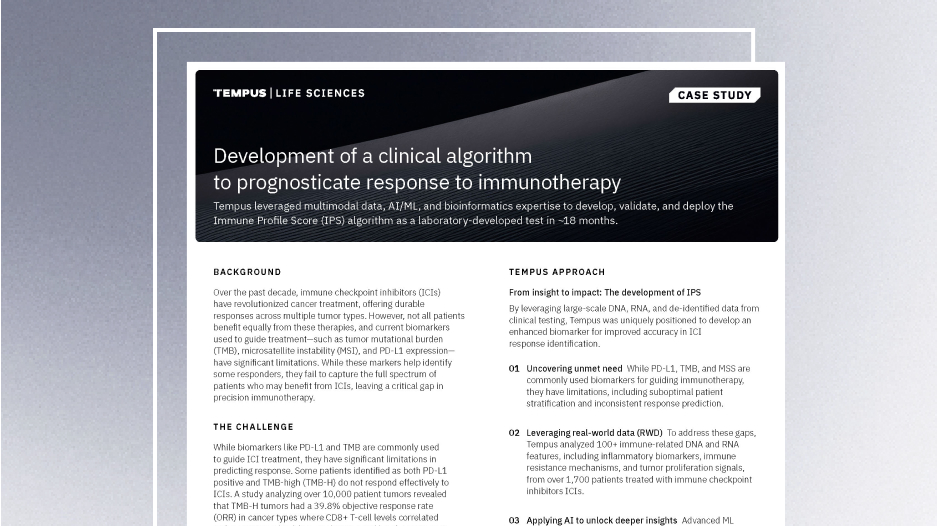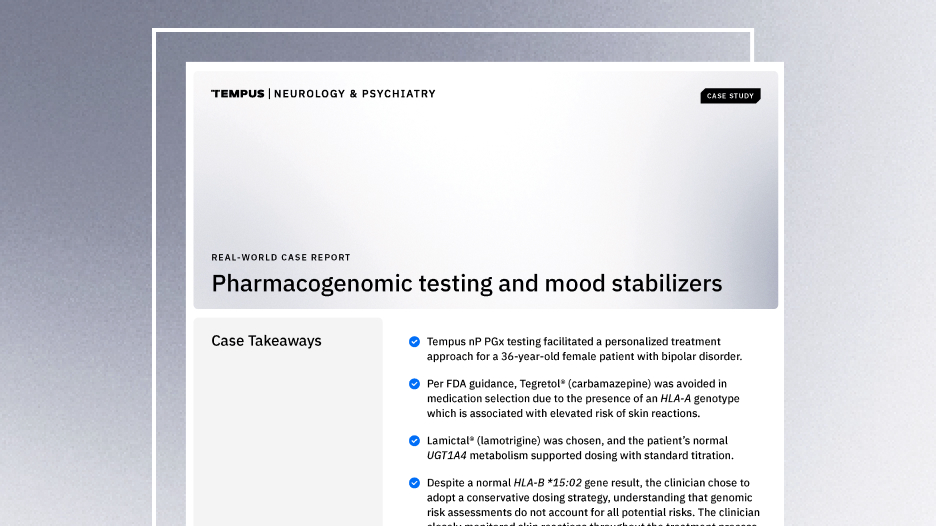-
PROVIDERS
Register now
Are you getting the full picture? A webinar series on the power of comprehensive intelligent diagnostics
-
LIFE SCIENCES
Enroll now
Tempus’ Patient-Derived Organoid ScreensEvaluate the efficacy of your preclinical compounds using fixed organoid panels designed for diverse therapeutic applications. Space is limited — enroll by June 30, 2025, to secure your spot.
-
PATIENTS
It's About Time
View the Tempus vision.
- RESOURCES
-
ABOUT US
View Job Postings
We’re looking for people who can change the world.
- INVESTORS
05/30/2024
Tempus Exhibits 16 Abstracts at the 2024 American Society of Clinical Oncology Annual Meeting
Tempus, a leader in artificial intelligence and precision medicine, today announced the company is scheduled to exhibit 16 abstracts at the 2024 American Society of Clinical Oncology (ASCO®) Annual Meeting, which convenes from May 31-June 4 in Chicago, Illinois. This year, Tempus is presenting its latest research, including new data from its minimal residual disease (MRD) assay, xM.
“We look forward to presenting an array of research demonstrating the power of our molecular profiling tests and multimodal data, but this year in particular, we are thrilled to unveil new data from xM,” said Ezra Cohen, MD, Chief Medical Officer of Oncology at Tempus. “We are presenting results on the performance of both our minimal residual disease and treatment response monitoring tests.”
Highlights from Tempus’ post presentation sessions include:
- Poster Presentation (3618/281): Longitudinal clinical performance of a novel tumor-naive minimal residual disease assay in resected stage II and III colorectal cancer patients: A subset analysis from the GALAXY study in CIRCULATE-Japan
- Session Date & Time: Saturday, June 1, 2024 from 1:30 PM – 4:30 PM CDT
- Overview: The Tempus xM assay, a tumor-naive minimal residual disease (MRD) test, was evaluated for its ability to predict recurrence in stage II and III colorectal cancer patients post-surgery. The study analyzed ctDNA at the landmark time point (4 weeks) and longitudinally (testing every 3 months for 24 months). Initial results showed clinical sensitivity and specificity at the landmark time point to be 61.1% and 87.9% respectively, and performance at the longitudinal time point to be a sensitivity of 83.3% and specificity of 89.5%. The xM MRD status correlated strongly with disease-free survival, outperforming carcinoembryonic antigen (CEA) levels (HR 9.69 vs 2.13). Finally, for patients who did not receive adjuvant chemotherapy, xM was able to identify those who were likely to relapse an average of 5.62 months before detection on radiographic scans.
- Poster Presentation (11082/277): Cost-effectiveness of a Circulating Tumor Fraction molecular biomarker for treatment response monitoring
- Session Date & Time: Monday, June 3, 2024, 9:00 AM-12:00 PM CDT
- Overview: The research team leveraged Tempus’ multimodal real-world database to demonstrate that the xM for therapy response monitoring (TRM) assay has the potential to act as a cost-saving alternative to diagnostic imaging for monitoring treatment response in cancer patients. Over the course of a planned 24-week treatment, xM for TRM-guided treatment decisions could have reduced the cost of therapy by approximately $4,400 per patient, on average, by reducing the duration of ineffective therapy by 4.3 weeks. Sensitivity analyses highlighted that this approach is likely to be cost-effective for a wide range of scenarios.
- Poster Presentation (3046/191): Relationship Between Dynamic Changes in Circulating Tumor Fraction and Real-World imaging with Real-World Survival in Patients with Solid Tumors Treated with Immunotherapy
- Session Date & Time: Saturday, June 1, 2024, from 9:00 AM-12:00 PM CDT
- Overview: The research team sought to assess if the addition of molecular response information from xM for TRM assay to clinician evaluation of imaging would allow for more accurate predictions of real world overall survival (rwOS) for patients undergoing treatment on immune checkpoint inhibitors (ICIs). By evaluating patients from Tempus’ real-world multimodal database the team found that the combination of xM for TRM and traditional imaging approaches provided a more accurate prognostic marker for rwOS than evaluation of imaging alone, with molecular responders having a 6 month longer rwOS on average than non-responders (16 vs 10 months).
To learn more, visit www.tempus.com/events/asco-2024.
About Tempus
Tempus is a technology company advancing precision medicine through the practical application of artificial intelligence in healthcare. With one of the world’s largest libraries of multimodal data, and an operating system to make that data accessible and useful, Tempus provides AI-enabled precision medicine solutions to physicians to deliver personalized patient care and in parallel facilitates discovery, development and delivery of optimal therapeutics. The goal is for each patient to benefit from the treatment of others who came before by providing physicians with tools that learn as the company gathers more data. For more information, visit tempus.com.
-
04/02/2025
Development of a clinical algorithm to prognosticate response to immunotherapy
Discover how Tempus developed and deployed the Immune Profile Score (IPS)—a powerful algorithm that provides prognostic insights into patient outcomes following treatment with immune checkpoint inhibitors (ICIs)—in ~18 months. This case study highlights the AI-driven methodology, real-world validation, and the impact of IPS in precision oncology.
Read more -
03/25/2025
AI & ML in action: Unlocking RWD with GenAI through Tempus Lens
Discover how Tempus is equipping researchers with innovative AI solutions to fully leverage the potential of multimodal data. Gain insights from a panel of leaders across healthcare and life sciences as they discuss the impact of these advanced tools on delivering insights with speed.
Watch replay
Secure your recording now. -
03/11/2025
Case Report: Pharmacogenomic testing and mood stabilizers
This real-world case demonstrates how the Tempus nP pharmacogenomic test facilitated a personalized treatment approach for a patient with bipolar disorder.
Read more


